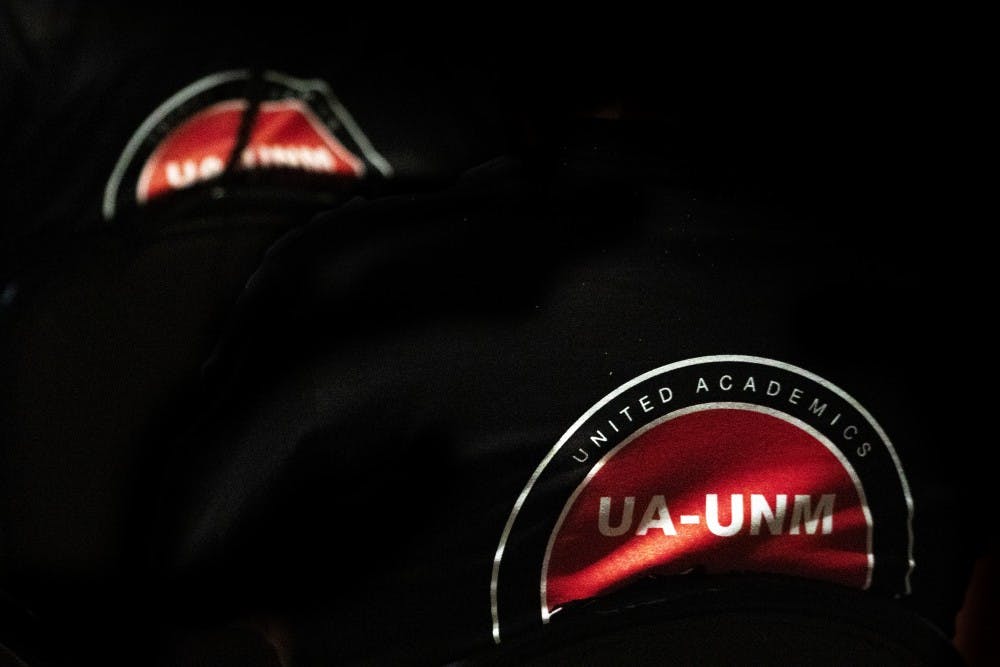Why is full-time and part-time faculty organizing together such a controversy?
This debate has dominated nearly all conversation around faculty unions in the U.S., which have grown in frequency the past few years. Around 35 percent of all public colleges and universities have some sort of faculty union.
The University of New Mexico is experiencing the same controversy now. Their response to a petition from the proposed union — United Academics of UNM (UA-UNM) — recommended rejecting the possibility of a union. This is partly because UNM considers adjunct and other part-time faculty to not be “regular, non-probationary employees,” a category they say the Public Employees Labor Relations Act forbids part-time faculty from unionizing.
However, some part-time faculty at UNM disagree with this categorization.
“Part-time temporaries don’t necessarily work part-time and they’re not temporary,” said Karen Champine, who works for UNM.
Champine used be a part-time instructor for 12 years, but is now a senior lecturer. She said her department, Mathematics and Statistics, is currently having 80 percent of its courses being taught by part-time faculty.
“They’re carrying the brunt of these lower-level classes,” Champine said, referring to part-time faculty.
Champine and Billy Brown, another part-time instructor in the math and statistics department, are active in UA-UNM, but both said they do not speak for the union in any official capacity. They also said one of the primary issues with part-time positions is the lack of job security. Currently, part-time faculty sign a contract every semester to teach a certain number of courses.
“The part-time person deserves a little more stability in their employment,” Brown said.
Another tenet of the University’s argument against the petition is what’s known as a “community of interest.” This is a legal term that defines who can join a union based off their desires from such a body. In their response, the University said that UA-UNM including tenure and non-tenured faculty in the unit constitutes “an inappropriate bargaining unit,” due to the “certain rights, protections and responsibilities” possessed by tenured faculty.
In other words, UNM is stating the two groups are too dissimilar to bargain together. The University suggested the groups form two separate unions.
Brown said a community of interest is shared by all faculty members. He said both groups share common concerns, such as rare pay increases, teaching loads and class sizes.
Get content from The Daily Lobo delivered to your inbox
“There is one big community of interest, and that is those of us who are supporting the union feel we would all benefit from having a collective bargaining unit,” Brown said.
Jackson Lewis
Debates concerning part-time and full-time faculty members in unions are nothing new.
Some schools, such as University of Oregon and Portland State, have unions that represent all of their faculty members. Others, like Northeastern University and Barnard College, have separate unions for each body.
Sonam Singh, an adjunct lecturer at Barnard, told the Daily Lobo that the college is represented by Jackson Lewis — a law firm that represents management in labor disputes — during negotiations, the same firm currently representing UNM.
Singh said university administrations attempting to separate unions based on rank is a common tactic of schools Jackson Lewis represents.
“They’ll say these people can’t be in a union together, because their interests are too far apart. Or, if that’s not going to work, they might say, ‘well these people are in the union (so) all these other people should be in the union’,” Singh said. “Whichever way they think will make the election harder.”
Barnard College was ultimately successful in forming their contingent faculty union. However, some schools represented by Jackson Lewis have avoided elections.
“If you’re a very difficult employer and willing to spend the money to pay Jackson Lewis to do all its tricks, it’s not impossible — in fact it’s fairly easy — to avoid a contract,” said David Rosenfeld, a labor attorney based out of Alameda, California, who has litigated against Jackson Lewis multiple times. One of the most recent cases was in 2018 against MGM Resorts, whom Jackson Lewis was representing.
Last year, full-time, non-tenured faculty at Northeastern University withdrew their petition to unionize because the university argued they qualified as management, who are not allowed to form a union. Rather than wait for a decision by the National Labor Relations Board, the budding union decided to withdraw.
The cost surrounding Jackson Lewis’ services have also been a controversial matter. The contract between UNM and Jackson Lewis is currently capped at $60,000, although it’s unclear if that prevents the University from spending more in the future. Singh said his union calculated that Barnard spent “hundreds of thousands of dollars” on representation.
“Jackson Lewis has always had a reputation of being an anti-union, union-buster,” Rosenfeld said. “They get hired for that purpose.”
Singh and Rosenfeld both said Jackson Lewis will often appeal election results, which can create delays that last for years.
Brown said a vote for the union by the faculty could have happened this semester were it not for the University’s response.
Brown and Champine both expect an election to be held sometime in the Fall 2019 semester. Champine said she believes the University is trying to stall the process.
In a written statement to the Daily Lobo received on March 12, President Garnett Stokes said UNM was “not interested in stalling the process, but we do believe we owe it to our community to carefully consider and evaluate the implications of unionization.”
The Labor Management Relations Board, who handles all labor disputes at UNM, will have to decide if the petition represents a valid bargaining unit. A hearing on the matter is expected later this month.
Kyle Land is the editor-in-chief of the Daily Lobo. He can be contacted by email at editorinchief@dailylobo.com.






